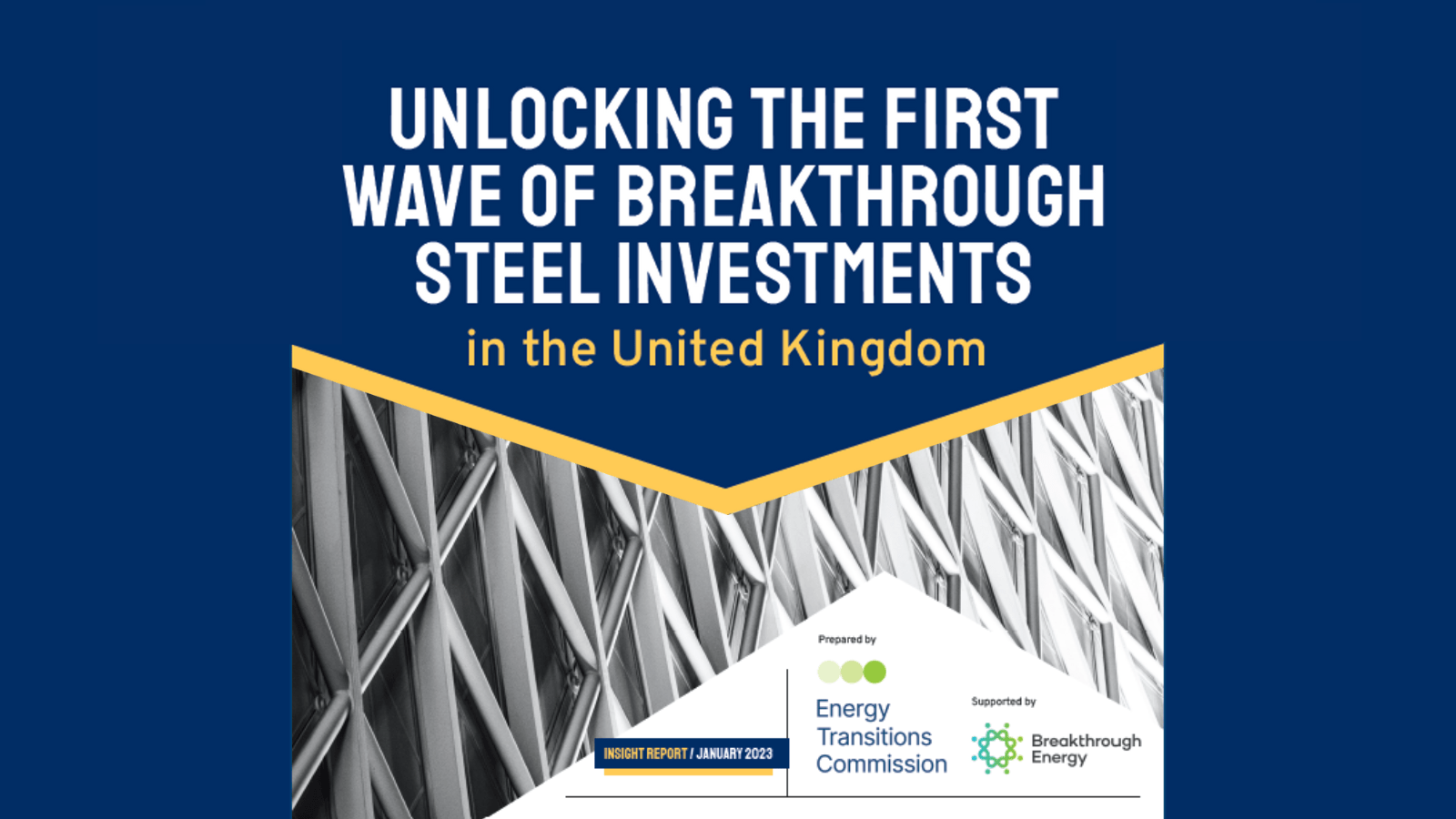LONDON, February 1st, 2023 – In a new report, Unlocking the first wave of breakthrough steel investments in the United Kingdom, the ETC highlights the key actions needed by industry and government to enable a first wave of near-zero emissions primary (ore-based) steelmaking projects in the UK. Currently, such projects face a gap to a viable investment case, so urgent action is needed to create certainty for investors and financiers to make final investment decisions (FIDs) and take this vital step in the net-zero transition.
Putting the global steel industry on a 1.5°C-aligned pathway to net zero requires a rapid scale-up of near-zero emissions primary steelmaking. The necessary breakthrough iron- and steelmaking technologies are available today, and the UK can join countries around the world in pioneering their deployment.
The right conditions for encouraging project proposals and enabling FIDs in the UK are within reach. Crucial actions include implementing effective carbon pricing on steel imports as well as domestic production, lowering electricity prices to make scrap recycling more economical, premium forward offtake agreements, guarantees to manage technology risk, and direct government support, particularly for the high upfront costs of developing breakthrough projects. All these actions are feasible in the short term and could unlock a first wave of breakthrough steel investments in the UK.
“Low-emissions primary steelmaking is not only desirable for the UK, but eminently possible, requiring only a few, strategic interventions by industry and government to enable a viable investment case. Both industry and government have acknowledged the need to rapidly decarbonise UK steel while preserving the capability to produce this important material domestically. This report charts a path for them to accomplish just that.” Adair Turner, Chair of the Energy Transitions Commission.
Breakthrough technology can future-proof the UK steel industry
National climate targets cannot be met without reducing emissions from steel, while the importance of steel to the UK energy transition and wider economy is driving up consumption of the material, with demand expected to rise by 20% between 2020 and 2030. Breakthrough steelmaking, where direct reduced iron (DRI) production technologies using green hydrogen are paired with electric arc furnaces (EAFs) for steelmaking, offers a solution to the challenges currently faced by the UK steel industry.
Investing in breakthrough steel projects would preserve domestic production capacity for an increasingly important resource and retain highly skilled jobs, all while helping the UK meet its climate goals. Breakthrough steel offers a better option than the other choices that government and industry could make, such as renovating existing primary steelmaking sites at the expense of the UK’s carbon budget, or closing them and deepening the country’s already growing dependence on steel imports for a variety of applications, from construction to vehicle manufacturing.
“Breakthrough steelmaking offers an opportunity both for the UK to future-proof its industry and for the global community to ramp-up the green steel transition. Deploying these technologies at commercial scale in the UK could make it a pioneer on the global stage, accelerating similar efforts around the world. Collaboration spanning the full steel value chain can create an investment case, but the time to act is now.” Julia Reinaud, Senior Director, Europe, Breakthrough Energy
Key conditions for a viable investment case
A final investment decision (FID) represents a critical point in the steel investment process, signaling a firm financial commitment upon which contractors can proceed with procurement, construction, design, and engineering works. FID status, therefore, represents a vital step to realising a steel project in the real world.
This report demonstrates that progressing UK breakthrough steel projects to FID is possible. Creating the conditions to enable this will rely on the following interventions by government, industry, buyers, and financial institutions:
Effective carbon pricing – The UK government is reported to be considering support measures totalling £600 million to maintain and green production at the country’s existing integrated steelmaking sites. Investing to transition the sites to breakthrough technologies would be a good use of this funding, but not if the resulting plants remain systematically uncompetitive with steel imports that face lower or zero carbon costs. Implementing a UK carbon border adjustment mechanism (or equivalent measure) to ensure both steel imports and domestic production face the same progressive carbon pricing would be essential.
Lower electricity prices to enable scrap recycling – Lowering electricity prices would help reduce a key cost driver for breakthrough steel production. In particular, it would reduce the electricity costs associated with recycling steel, enabling breakthrough projects to better leverage the UK’s supply of scrap steel, which is currently underutilised and exported in volumes of around 8 million tonnes per year.
Premium forward offtake agreements – Forward purchase agreements from steel buyers, involving an initial price premium commensurate with the costs of producing breakthrough products, will be important for firming up revenue streams for breakthrough projects and underpinning their investment case.
Guarantees for technology risk – Financial guarantees, normally backed by government or public financial institutions, would help de-risk the uncertainty associated with novel breakthrough technologies and gives the financiers the confidence to commit to FIDs.
Government funding – Breakthrough projects that preserve ironmaking capacity in the UK will likely require a level of direct government support. Subsidies for their high upfront capital expenditures would allow government to provide adequate support in a one-off mechanism. Subsidies for operational expenditures, chiefly for green hydrogen, would also be very impactful but would involve a longer-term commitment on the part of government.
Cross-value chain collaboration is needed, particularly government intervention
While a variety of actors will be needed to advance breakthrough steel projects in the UK (including iron miners, energy suppliers, original equipment manufacturers, steelmakers, buyers, and financiers), the most important conditions for unlocking investment highlight the indispensable role of government in enabling FIDs. Action on carbon pricing, electricity prices, financial guarantees, and potentially also on public procurement and direct funding support, would require a clear shift in government strategy towards steel. It would require switching away from an approach of moving from crisis to crisis and instead setting out a clear vision for the future of the industry.
“I’m convinced the UK steel sector can be an international and clean leader. But to make this happen, industry and government must work together. We need reform in energy markets, change in carbon border rules and incentives so we can make the most of our abundance of scrap steel. At the same time, we must develop UK skills – especially among the young – so we can make the most of our manufacturing assets and equip UK steel to secure a sustainable future.” Jeff Kabel, Chief Transformation Officer, LIBERTY Steel.
This report is underpinned by a financial model, developed by the ETC, that simulates the financial performance of different breakthrough steel project configurations in the UK. The financial model has been made open-access for public use. To read the insight report and access the model click here.
‘Unlocking the first wave of breakthrough steel investments in the United Kingdom’ was developed as part of a series of roundtables in the UK, convened by the ETC between July – November 2022 with the support of Breakthrough Energy. The roundtables were open to UK steel value chain stakeholders, including policymakers and financiers, and saw participation from organisations including Anglo American, British Constructional Steelwork Association, British Metals Recycling Association, BP, British Steel, Cargill Metals, Citi, Climate Change Committee, Costain, Danieli, Department for Business, Energy & Industrial Strategy, Green Finance Institute, Hynamics, ING, Liberty Steel, Macquarie Group, Material Processing Institute, National Grid, Ørsted, ResponsibleSteel, Rocky Mountain Institute, Rio Tinto, Shell, Swansea University, Skanska, Standard Chartered, Stemcor, Tata Steel, UK Export Finance, UK Infrastructure Bank, UK Research and Innovation, and UniCredit.
Media contacts:
Caroline Randle, Energy Transitions Commission – [email protected]



